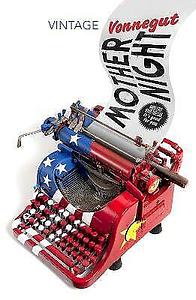Take a photo of a barcode or cover
As Vonnegut says in the introduction, the moral of this story is clear: “We are who we pretend to be”. This was by far the darkest of his novels that I’ve read thus far, as we’re asked to get inside the mind of an infamous Nazi propagandist. Time and time again, the fact that he was actually an spy for the United States the whole time, injecting secret codes into his hateful propaganda, is made irrelevant by the acts of pure evil he committed on behalf of Nazi Germany. In order to survive the war without becoming caught he has to commiserate with some of the most reprehensible war criminals in history, playing the part of a true believer. In a conversation with his German father-in-law just before the end of the war, his father-in-law says he no longer cares if he was a spy or not (as he had long suspected) because there was no way he had done more for the US than he had for the Nazis.
A general theme of Vonnegut’s characters is that they often seem to go through life without much agency - events just seem happen to them. The case of Howard W Campbell, Jr is no exception, but in this case it is much more damning. When he was offered to become a spy before the war he was a writer inspired by his great love for his wife. He was never a true believer in anything political, and in fact was apathetic to any kind of allegiance to any nation beyond his “nation of two” with his wife. So why does he accept the proposal to spy for the United States, knowing full well what it would require him to do? We’re not told, but the results are clear. He becomes what he pretends to be, does horrible things for evil people, and after the war becomes an outcast from society.
Campbell admits to the reader that he is worse than even the architect of Auschwitz itself, because unlike them, who Campbell suspects could not differentiate right and wrong within his head, Campbell did things knowing exactly how evil they were. And he did them anyway. The fact that he was a spy did not make him better than the Nazis, but in many ways made him worse.
This book made me think a ton (clearly, by the length of this review), and also made me deeply uncomfortable throughout. It’s a masterpiece not entirely dissimilar to a movie like Zone of Interest - portraying the day-to-day lives of reprehensible individuals - but with a touch of dark humor layered on top because of the absurdity of Campbell’s life.
A general theme of Vonnegut’s characters is that they often seem to go through life without much agency - events just seem happen to them. The case of Howard W Campbell, Jr is no exception, but in this case it is much more damning. When he was offered to become a spy before the war he was a writer inspired by his great love for his wife. He was never a true believer in anything political, and in fact was apathetic to any kind of allegiance to any nation beyond his “nation of two” with his wife. So why does he accept the proposal to spy for the United States, knowing full well what it would require him to do? We’re not told, but the results are clear. He becomes what he pretends to be, does horrible things for evil people, and after the war becomes an outcast from society.
Campbell admits to the reader that he is worse than even the architect of Auschwitz itself, because unlike them, who Campbell suspects could not differentiate right and wrong within his head, Campbell did things knowing exactly how evil they were. And he did them anyway. The fact that he was a spy did not make him better than the Nazis, but in many ways made him worse.
This book made me think a ton (clearly, by the length of this review), and also made me deeply uncomfortable throughout. It’s a masterpiece not entirely dissimilar to a movie like Zone of Interest - portraying the day-to-day lives of reprehensible individuals - but with a touch of dark humor layered on top because of the absurdity of Campbell’s life.
As always, Kurt Vonnegut writes a book that I love. Ending was unexpected yet also perfect for the story, though: trigger warning.
challenging
dark
funny
sad
medium-paced
‘We are what we pretend to be, so we must be careful about what we pretend to be.’
If you're new to Kurt Vonnegut, this is the book to start with. Full of purpose, void of wacked out happenings. The political commentary is still relevant today, perhaps more than ever.
dark
funny
fast-paced
Plot or Character Driven:
A mix
Strong character development:
Yes
Loveable characters:
Complicated
Diverse cast of characters:
Yes
Flaws of characters a main focus:
Yes
Finished Mother Night by Kurt Vonnegut, and aside from the ending, I thought it an excellent, and very f'ing relevant, book. Definitely a keeper.
"We are what we pretend to be, so we must be careful about what we pretend to be."
"We are what we pretend to be, so we must be careful about what we pretend to be."
dark
emotional
funny
fast-paced
Plot or Character Driven:
Character
Strong character development:
Complicated
Loveable characters:
No
Diverse cast of characters:
No
Flaws of characters a main focus:
Yes
I liked it less than SH5 but still a good bit.




